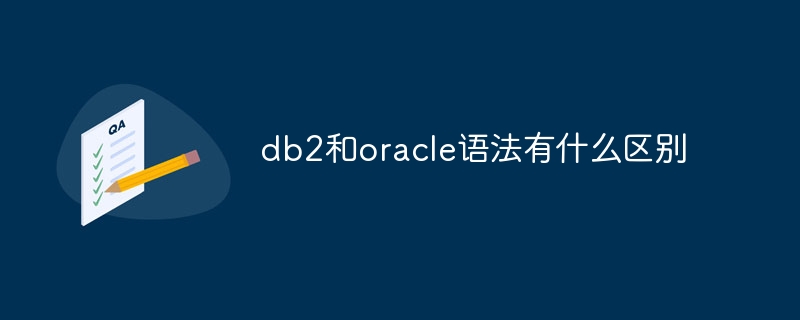
Differences in syntax between db2 and oracle: 1. Differences in SQL syntax. Although db2 and oracle both use structured query language, they have some differences in syntax; 2. db2 and oracle have different data types; 3 , Foreign key constraint definition, DB2 can be defined when creating the table or added after using the "ALTER TABLE" statement, Oracle needs to be defined together when creating the table; 4. There are also some differences in the syntax of DB2 and Oracle stored procedures and functions.

#The operating environment of this article: Windows 10 system, dell g3 computer.
db2 and oracle are two different relational database management systems (RDBMS), each with their own unique syntax and features. In this article, we will discuss the main differences between db2 and oracle syntax.
1. SQL syntax differences:
Although both db2 and oracle use Structured Query Language (SQL), they have some differences in syntax. For example, in db2, you can use the `FETCH FIRST n ROWS ONLY` clause to limit the number of records returned, while in oracle you can use `ROWNUM`. In addition, in terms of sorting, DB2 uses the `ORDER BY` clause to specify the sort order, while Oracle uses `ORDER BY` and `FETCH FIRST n ROWS ONLY` together.
2. Data type differences:
db2 and oracle have different data types. Although they both support basic data types such as integers, floating point numbers, and characters, there are differences in some data types. For example, DB2 has `CLOB` (Character Large Object) and `BLOB` (Binary Large Object) data types, while Oracle uses `CLOB` and `BFILE` (External Binary File) to store large data objects.
3. Foreign key constraint definition:
In db2, foreign key constraints can be defined when creating a table or added after using the `ALTER TABLE` statement. For example, you can use the following syntax to define foreign key constraints when creating a table:
CREATE TABLE orders ( order_id INT PRIMARY KEY, customer_id INT, FOREIGN KEY (customer_id) REFERENCES customers(customer_id) );
In Oracle, foreign key constraint definitions need to be defined together when creating a table, for example:
CREATE TABLE orders ( order_id INT PRIMARY KEY, customer_id INT, CONSTRAINT fk_customer FOREIGN KEY (customer_id) REFERENCES customers(customer_id) );
4. Differences between stored procedures and functions:
There are also some differences in the syntax of db2 and oracle stored procedures and functions. In db2, stored procedures and functions can be defined using the `CREATE PROCEDURE` and `CREATE FUNCTION` statements. In Oracle, stored procedures and functions can be declared using `CREATE PROCEDURE` and `CREATE FUNCTION` or using `CREATE OR REPLACE PROCEDURE` and `CREATE OR REPLACE FUNCTION`.
In addition, there are some differences in the syntax of stored procedures and functions in terms of parameter passing and use. In DB2, you can use the `INOUT` keyword to define a parameter that can be both input and output, while in Oracle you can use `IN`, `OUT` and `IN OUT`.
Summary
There are some differences in syntax between db2 and oracle. These differences include SQL syntax, data types, foreign key constraint definitions and the syntax of stored procedures and functions, etc. For developers developing and maintaining DB2 and Oracle databases, it is important to understand these differences to ensure proper use and operation of the database
The above is the detailed content of What is the difference between db2 and oracle syntax. For more information, please follow other related articles on the PHP Chinese website!